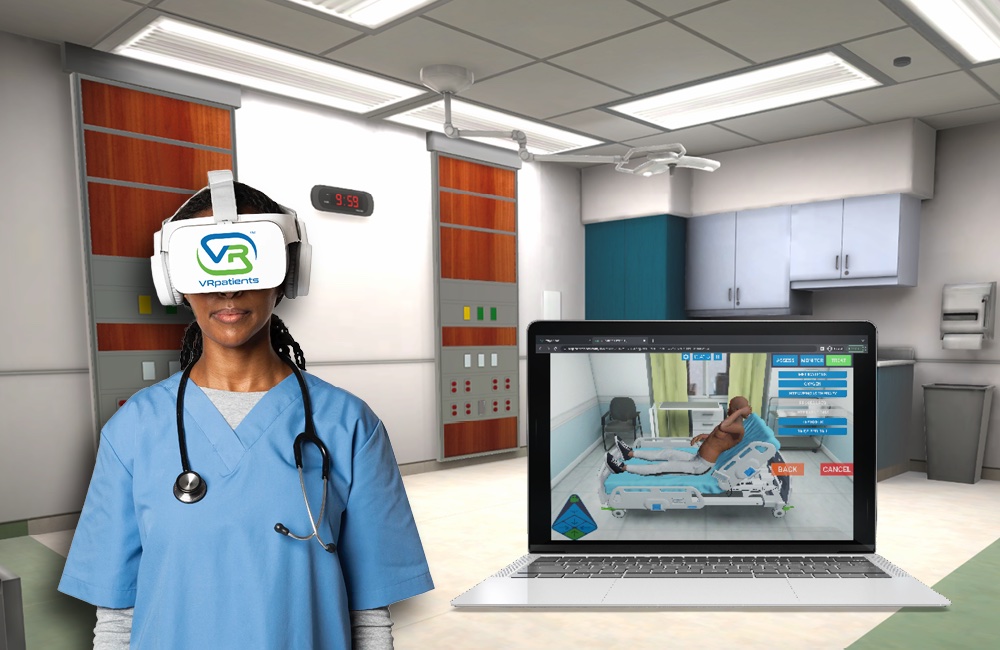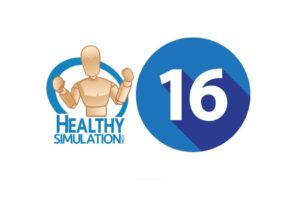How to Become a Virtual Reality Nurse Educator
The role of a nurse is an incredibly important position across the field of medicine, but for these care providers to be effective they need to have received quality education and training. In recent years, especially given the push stemming from the COVID-19 pandemic, a newfound reliance on virtual learning has reshaped the way such education has traditionally been provided. Now, given the option for virtual reality learning in nursing, specially designated “Virtual Reality Nurse Educators” are needed to provide the necessary instruction. This HealthySimulation.com article focuses on how to become a Virtual Reality Nurse Educator and provides more information on what the healthcare simulation role entails.
Ultimately, a VR Nurse Educator teaches learners of all levels about the various skills and techniques needed to treat patients. In doing so, they must first assess learners’ current knowledge and understanding of the field and build upon this foundation. In addition to the responsibilities included in a nursing role, virtual reality nurse educators simultaneously work to ensure that nursing learners are confident in their abilities, and understand the emotional challenges they may encounter working in a number of different medical settings.
To be able to achieve these outcomes, Virtual Reality Nurse Educators should have a passion for both the fields of medicine and education. As not all learners enter a program with the same background, patience becomes an important attribute and is extremely beneficial when providing instruction to groups of learners. They should be empowered to design healthcare simulations to teach learners their way. VR Nurse Educators must also place great value on their responsibility to instruct the nurses of tomorrow, as patients’ well-being depends on the thoroughness of their training.
Sponsored Content:
VR Nurse Educator Employment Details
Typically, Virtual Reality Nurse Educators are employed by a healthcare simulation center, college or university, or another medical facility that provides instruction to learners and trainees. According to NurseJournal.org, the top paying industries for Nurse Educators include general medical and surgical hospitals, psychiatric and substance abuse hospitals, business schools, and computer and management training, followed by colleges, universities, and professional schools. Junior colleges also hire VR Nurse Educators, but typically pay less than the other industries.
The U.S. Bureau of Labor Statistics currently predicts a higher-than-average increase in demand for Nursing Educators; between 2019 and 2029.p This demand is projected to increase by 9% for all postsecondary educators. Most often, Nurse Educators of any type, including VR Nurse Educators, must have an MSN. This degree can be earned in as little as two years if the educator has already obtained a Bachelor of Science in Nursing degree. For RNs without a BSN, obtaining a master’s degree can take up to four years or longer.
Specifically, in terms of virtual reality use across nursing educators, the use of immersive simulation has become an essential tool in the toolbox. This is because VR simulation training has proven to reduce the cost of nurse turnover while helping to engage and retain Nurse Educators by providing them with the tools they need to succeed in VR.
Sponsored Content:
According to the e-learning company VRpatients, overlaying the role of a Nurse Educator with VR can set an education program up for success. “Employing virtual reality simulation expands the ability of Nurse Educators to reach more clinicians across the hospital and health systems” according to Anne Montera, Director of Nursing for VRpatients. “Further, VR allows Nurse Educators to evaluate the clinician’s progress and determine where additional education is needed,” she added.
“Overall, VR provides an excellent opportunity for Nurse Educators to research the new delivery model’s impacts on learning and retention. When new policies or procedures need to be implemented across the health system, VR serves as a quick, convenient, and exceptional way to deliver education and ensure competence,” said Montera. “Thus, there is a great benefit to building virtual reality training into any nursing curriculum, and having VR Nurse Educators on staff to provide the instruction is imperative.”
VRpatients for Nursing
To assist in the training of nursing learners, VRpatients has developed “real-life training without real-life consequences.” The company’s clinical simulation scenarios provide access to limitless case scenarios that awaken a learner’s intellect. An intuitive authoring tool has the unmatched ability to create content tailored to each educator’s specific training objectives – without the requirement of coding. They may also choose to use or modify one of the dozens of pre-built cases authored by VRpatients’ clinical team.
VRpatients for nursing takes the risk out of real-life training by implementing repeatable, lifelike virtual simulations with responsive patient avatars that react in real time. VRpatients allows the Nursing Educator to objectively assess the clinical judgment of nurses to ensure their clinical competency and train quickly on new or existing protocols with its error-proof case logic.
Now more than ever, new graduate nurses are entering the nursing workforce with limited patient care experience. Staffing demands have created a surge in travel nurses adding facility challenges in assessing their competency for the job at hand. To make matters worse, there is an industry shortage of nurse educators and expert preceptors. These factors can be mitigated through the incorporation of VRpatients software into a healthcare simulation curriculum. Once obtained, nursing educators have access to:
- A “build it how you want it” intuitive case authoring tool
- Lifelike patient modeling, realistic moulage, and animations presented in living environments
An enhanced grading rubric - A platform that is available online or through immersive VR via a headset
- A secure administrative management tool and agnostic LMS Application Programming Interface (API)
More About VRpatients
VRpatients is a physiologically based clinical training platform that immerses a healthcare provider or first responder into actual clinical case scenarios, allowing them to assess, diagnose and treat patients in real-time. Available through a web-based platform or through a full clinical simulation experience using a virtual reality headset such as the Oculus, Pico, or HTC Vive headsets.
VRpatients allows first responders to test and expand their clinical skills, reducing the likelihood of critical performance failure. Subscription-based options are flexible, based on the organization’s needs.
Learn More About VRpatients
Lance Baily, BA, EMT-B, is the Founder & CEO of HealthySimulation.com, which he started while serving as the Director of the Nevada System of Higher Education’s Clinical Simulation Center of Las Vegas back in 2010. Lance is also the Founder and acting Advisor to the Board of SimGHOSTS.org, the world’s only non-profit organization dedicated to supporting professionals operating healthcare simulation technologies. His co-edited Book: “Comprehensive Healthcare Simulation: Operations, Technology, and Innovative Practice” is cited as a key source for professional certification in the industry. Lance’s background also includes serving as a Simulation Technology Specialist for the LA Community College District, EMS fire fighting, Hollywood movie production, rescue diving, and global travel. He and his wife Abigail Baily, PhD live in Las Vegas, Nevada with their two amazing daughters.
Sponsored Content:
















